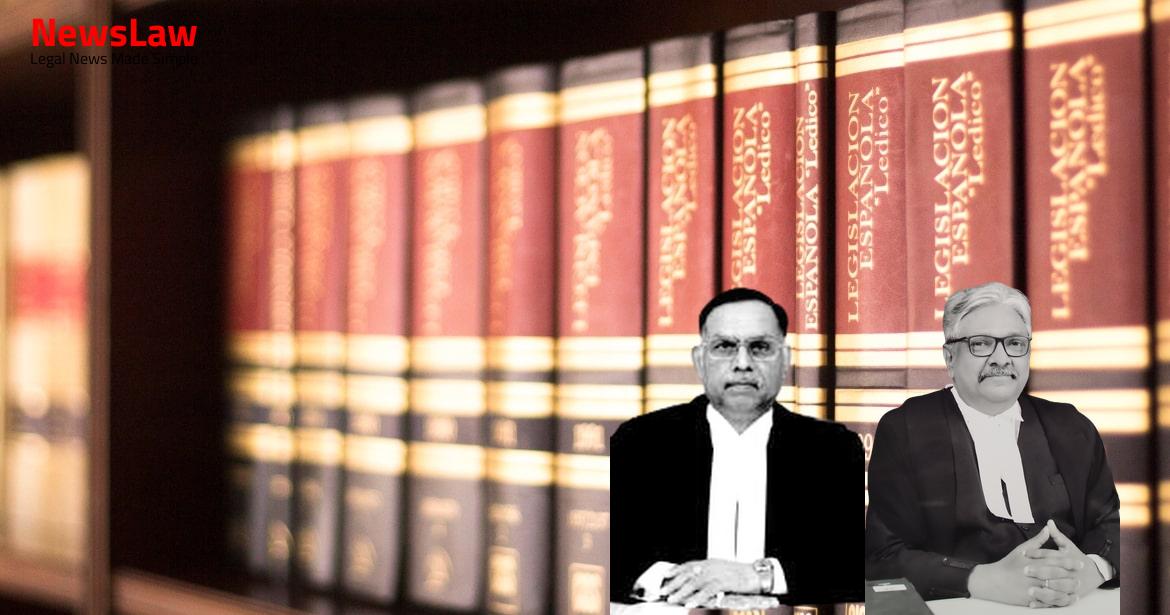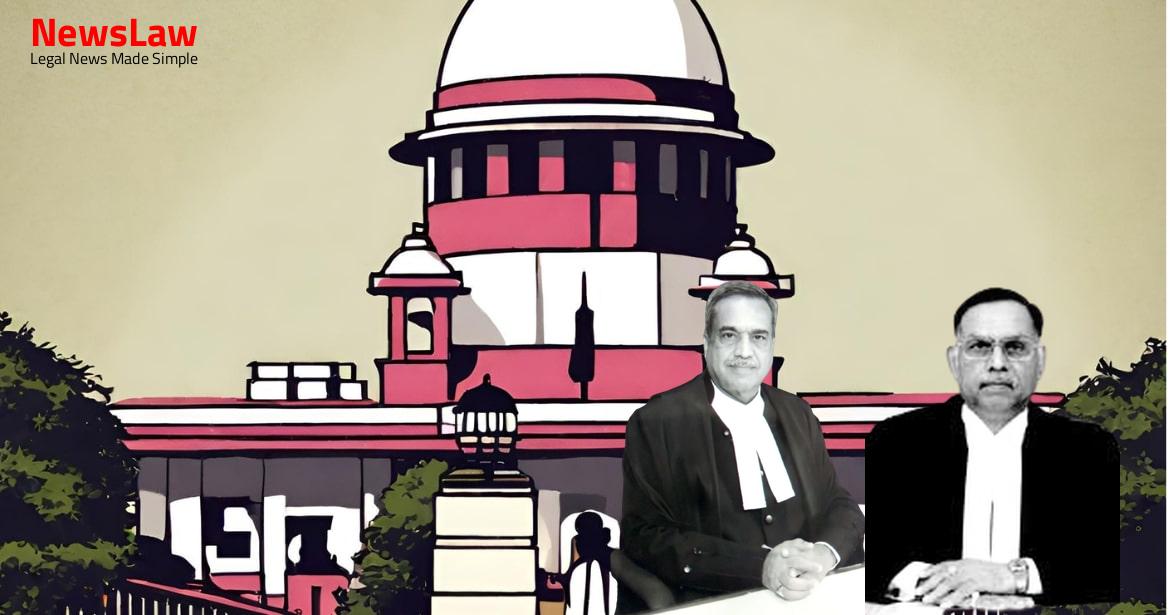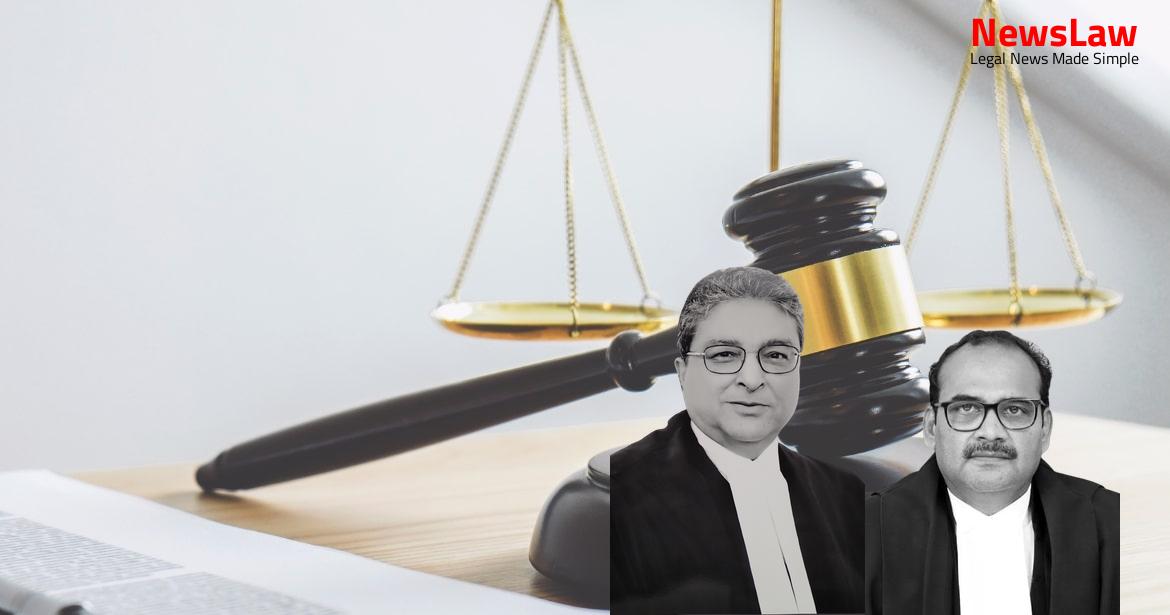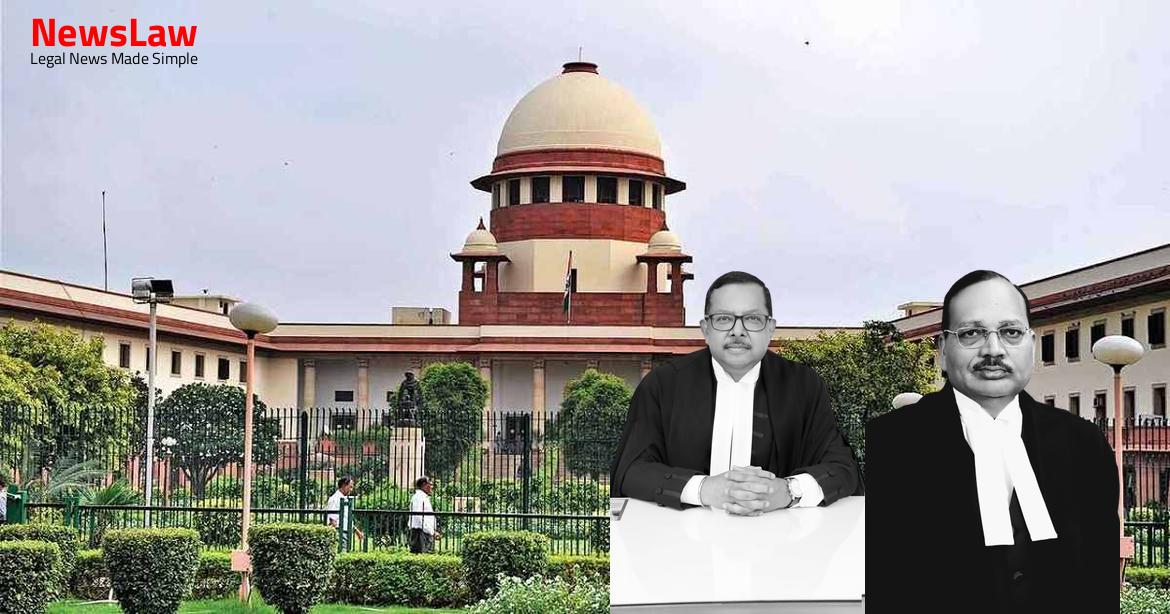Exploring the recent Supreme Court judgement on the sanction requirement in a forgery case involving a public servant. The case delves into the complexities surrounding the role of public servants in carrying out official duties and the critical aspect of obtaining prosecution sanction. Stay tuned for a detailed analysis of this significant legal ruling.
Facts
- The appellant was accused of opening a fictitious savings bank account in the name of Gautam Dhar to encash a cheque.
- Several DDA employees and property dealers were involved in illegally reducing the cost of a flat with forged documents.
- Handwriting analysis and forensic reports were obtained as evidence against the appellant.
- The appellant was charged under various sections of the IPC for fraud and forgery.
- The appellant appealed against the judgment of the Delhi High Court which dismissed the application to set aside the order.
- The Chief Metropolitan Magistrate rejected the appellant’s application seeking discharge without prosecution sanction.
- A charge was framed against the appellant on 13.12.2014 under Section 465/120-B IPC.
- The appellant filed an application stating the requirement of prosecution sanction as a public servant employed with a nationalized bank.
- The appellant filed an application under Section 482 Cr.P.C before the High Court of Delhi.
- The prayers made in the application included setting aside the order of the CMM dated 03.12.2014 which dismissed the discharge application of the petitioner.
- Another prayer was to set aside the order dated 13.12.2014 passed by the CMM, which framed charges against the petitioner without obtaining sanction for prosecution under Section 197 Cr.P.C.
- The appellant also sought quashing of FIR No. 432/2000 and the charge-sheet along with further proceedings originating from it, registered at PS: Kotla Mubarakpur, Delhi.
- Lastly, the appellant requested the High Court to pass any further orders deemed fit in the interest of justice.
Also Read: Entitlement to Back Wages: Upholding Justice
Arguments
- The appellant, a public servant, argues that sanction under Section 197 Cr.P.C. should have been obtained for prosecuting him.
- The counsel for the respondent disputes this claim, stating that the allegations of forgery against the appellant were not performed in the line of official duty.
- The rejection of the appellant’s application for discharge by the CMM due to lack of sanction is contested by the appellant.
- The FSL report was a part of the evidence collected by the Investigating Officer but its evidentiary value was yet to be determined in trial.
- A previous FSL report did not conclusively match the appellant’s signature with that on the account opening form, leading to another report being requested.
- The subsequent report indicated a match between the signatures, but the appellant disputes this claim.
- The opinion of a handwriting expert, while relevant, is deemed weak evidence and should not have been solely relied upon to reject the appellant’s claim.
- The CMM’s decision to hold the appellant guilty of forgery before trial completion is criticized.
- While sanctions were obtained for other DDA officials, none were obtained for the appellant, leading to a challenge by the appellant’s counsel.
- The appellant’s defense rests on the action of permitting the opening of a savings account as part of his official duties, emphasizing the supplementary nature of the charges against him.
- The Court has held in Parkash Singh Badal and Another Vs. State of Punjab and Others, (2007) 1 SCC 1 that offences like cheating under Section 420, as well as offences under Sections 467, 468, 471, and 120B, cannot be considered as committed by a public servant in the discharge of official duty.
- The State’s argument is that the rejection of the appellant’s application by the CMM was justified.
- The nature of offences such as cheating under Section 420 and others mentioned does not align with actions of a public servant in the course of official duty.
Also Read: Remand Order Upheld: Legal Analysis in The Case of The National Investigation Agency vs. The State
Analysis
- The appellant filed an application questioning the maintainability of the prosecution for want of sanction under Section 197 Cr.P.C.
- The Metropolitan Magistrate and the High Court rejected the application.
- The Court dismissed the appeal stating that even though a person working in a nationalized bank is a public servant, Section 197 provisions are not attracted.
- Expert evidence on handwriting is opinion evidence and needs corroboration by clear, direct, or circumstantial evidence.
- Official status provides an opportunity for the commission of the offense but is not necessarily a bar for prosecution.
- The onus is on the accused to prove the necessity of sanction if pleaded as a bar.
- Relevant case laws were cited to emphasize the necessity of obtaining sanction for offenses committed in discharge of official duty.
- Different judgments reiterated the proposition laid down in the Parkash Singh Badal case.
- The authority competent to remove the public servant from the office allegedly misused is the competent sanctioning authority.
- In certain cases, the fortuitous circumstance of the accused holding a different public office does not make the sanction irrelevant.
- The appellant cannot claim protection under Section 197 Cr.P.C.
- Examination of further question on whether the appellant was acting in discharge of official duty was not required.
- The appellant is not holding a post where he could not be removed from service except with government sanction.
- Sanction under Section 197 Cr.P.C. was not applicable as the appellant is not a public servant removable with government sanction.
- The Magistrate should avoid forming conclusive opinions regarding evidence collected during investigation before final trial.
- The CMM’s opinion that the appellant committed forgery should have been based on corroborated evidence.
- Forgery by a public servant cannot be considered an act done in discharge of official duties
- Expert evidence on handwriting is opinion-based and not conclusive.
- A handwriting expert’s sole evidence is not sufficient for a definite finding.
- Section 197 Cr.P.C. is not attracted if the public servant is removable without government sanction.
- The court can compare disputed writing with admitted or proved writings of a person.
- The accused has not satisfied the Court that Section 197 Cr.P.C. applies in this case because at the relevant time, he was a public servant not removable from his office saved by or with the sanction of the Government.
- Section 197 Cr.P.C. provides that no Court shall take cognizance of an offence alleged to have been committed by a Judge, Magistrate, or a public servant not removable from his office without the sanction of the Government.
- Offences like cheating under Section 420, or offences under Sections 467, 468, 471, and 120B cannot be considered as committed by a public servant in the discharge of official duty.
- Appellant not removable by or covered by Section 197 Cr.P.C, thus not saved with the sanction of the Government.
- An act of forgery by a public servant cannot be considered as an act done in discharge of official duties.
- Exception cannot be taken to the above propositions.
Also Read: Supreme Court Ruling on Recruitment Rules Challenge
Decision
- The order of the CMM dated 03.12.2014 rejecting the application under Section 23 of the Cr.P.C. was upheld.
- The rejection was based on the appellant not being removable by his office saved by or with the sanction of the Government.
- The appeal was partly allowed based on the above point.
- The observations made by the CMM in its order were deleted, although the orders of the High Court and CMM were upheld.
Case Title: S. K. MIGLANI Vs. STATE NCT OF DELHI
Case Number: Crl.A. No.-000744-000744 / 2019



